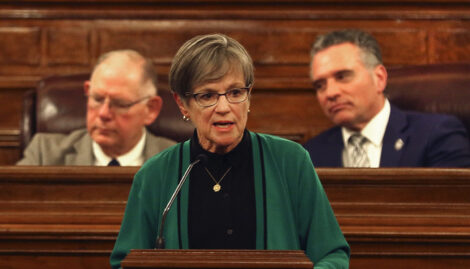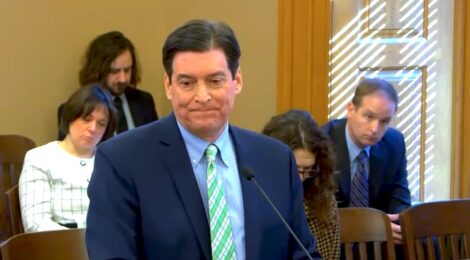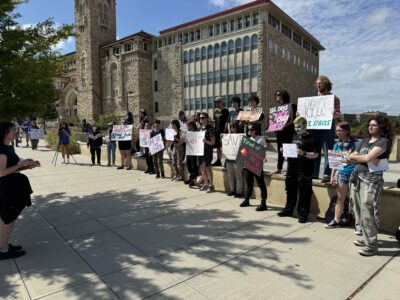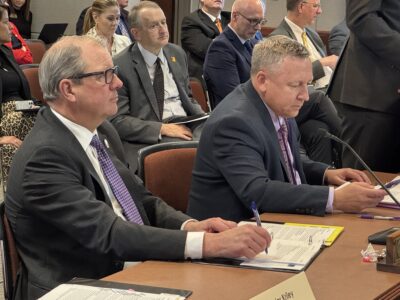Gov. vetoes coal plant bill
Sebelius, Legislature may be headed for showdown over 'policy issue'
Topeka ? Fight or compromise?
After Gov. Kathleen Sebelius vetoed legislation Friday that would authorize the construction of two coal-fired power plants, legislative leaders vowed to try to push for votes to override the veto.
That could set the stage for a dramatic showdown between the Legislature and Sebelius over the issue that has dominated the legislative session and attracted national attention in the debate over climate change and the effect of carbon dioxide emissions from coal-fired electric generation plants.
“I strongly disagree with the governor on this very important public policy issue,” said Senate President Steve Morris, R-Hugoton.
Sebelius made good on her promise Friday to strike down the legislation, saying the bill would harm the environment, jeopardize Kansans’ health and lead to higher electric rates for customers. Along with the veto, Sebelius signed an executive order establishing an advisory panel of business leaders, energy experts and scientists to find ways to reduce greenhouse gas emissions in Kansas.
“Instead of building two new coal plants, which would produce 11 million tons of carbon dioxide each year, I support pursuing other, more promising energy and economic development alternatives,” Sebelius said.
Support for plants
Supporters of the two 700-megawatt units in southwestern Kansas decried Sebelius’ position, saying the project would be the cleanest coal-fired facility in the state, comply with all existing regulations and benefit the economy.
“Not allowing clean coal technology to be part of Kansas’ energy future will result in a devastating increase in the average Kansan’s electric bill,” Morris said.
Hays-based Sunflower Electric Power Corp. and two out-of-state companies proposed building the $3.6 billion plants near Holcomb. Under the proposal, about 85 percent of the power would be sold to customers outside of Kansas.
Last October, Kansas Department of Health and Environment Secretary Roderick Bremby denied permits for the project, citing concerns about carbon dioxide emissions and their effect on climate change.
Legislators approved a bill that would essentially require that the permits for the plants be given and strip Bremby of much of his environmental authority.
Counting override votes
After the veto Friday, Morris and House Speaker Melvin Neufeld, R-Ingalls, said they would try to get the two-thirds majorities in the House and Senate that would be needed to override Sebelius’ action. But neither said when they would try the overrides.
The legislation – House substitute for Senate Bill 327 – passed with more than a two-thirds majority in the 40-member Senate, 31-7, but fell short of the 84 votes needed in the 125-member House when it was adopted, 75-47.
State Sen. Marci Francisco, D-Lawrence, voted against the bill and said the time is now for supporters of the plants to negotiate with Sebelius.
“We’ve squandered a lot of time trying to tie it to an issue of just these two coal plants instead of talking about where we need to go in terms of a statewide energy program,” Francisco said.
But state Sen. Roger Pine, R-Lawrence, who has voted for the bill, said legislative leaders should conduct an override vote.
“I think that the Legislature has truly tried to come up with something that while, yes, it includes a coal-fired plant, it also includes some of the things that we need to do to have an energy policy in place, and have wind and other forms of renewables,” Pine said.
House Democratic Leader Dennis McKinney of Greensburg also has voted for the bill but believes another piece of proposed legislation will be forthcoming that will include more “green things.”
Francisco said an override attempt also opens up the legislative process to more arm-twisting and deal-making that may not be in the state’s best interest.
“I would be concerned there would be an even greater attempt to limit other initiatives from going forward again over this single bill that addresses only 200 megawatts of energy for Kansas,” she said.
In the past, Sebelius has offered to support one 660-megawatt coal-fired unit and a commitment from Sunflower Energy to increase wind power and make other environmental concessions. She said the deal is still there.
“I am hopeful that some serious consideration can now occur,” she said.
Sunflower officials have refused the offer, saying it wasn’t economically feasible.
Sierra Club statement regarding Governor Sebelius’ decision to veto SB 327
The Sierra Club is pleased with Governor Sebelius’ decision to veto energy bill 327 today. Kansas is in a unique position to demonstrate leadership in addressing climate change.
From a statewide poll that demonstrated support for Secretary Bremby’s decision to deny Sunflower an air quality permit, to the hundreds of people who participated in Clean Energy Day this month, it’s clear Kansans want clean energy and our state leaders should honor this wish by upholding the Governor’s veto. The Governor’s decision will allow Kansas to prepare for expected federal carbon regulations while protecting the environment, health and economy of Kansas. While other states are moving away from outdated energy technology and making efforts to reduce their carbon emissions, it would be unfair of Kansas to counteract their efforts by adding two coal plants that would collectively emit 11 million tons of carbon dioxide per year.
Statement from the Holcomb Station Expansion Project
Gov. Kathleen Sebelius today vetoed comprehensive energy legislation overwhelmingly approved by the Kansas Legislature.
Senate Bill 327 has broad support from Kansas business and industry, agriculture, labor, and most importantly, Kansas citizens who agree that sound energy policies are necessary.
“I am certainly disappointed by the Governor’s veto,” Earl Watkins, Sunflower’s president and CEO said. “This compromise bill was the result of many months of hard work by Democrats and Republicans in both the House and the Senate. The legislation protects our environment, supports renewable energy and energy efficiency programs, and restores confidence in government.”
“If not overturned, this veto will unnecessarily raise electric rates for Kansas families and punish our Kansas workers and industries,” Watkins said. “We are experiencing significant growth on the Sunflower system, and we must add new coal generation to support our existing natural gas and wind generation assets.”
Earnie Lehman, Midwest Energy’s president and general manager, agreed that failure of the bill will have a negative effect throughout the state.
“The governor’s veto fails to meet our customers’ need for reliable, efficient, and cost-effective around-the-clock energy,” said Lehman. “Midwest Energy’s leadership in securing wind energy and expanding energy efficiency and conservation programs is simply not enough to meet our consumers’ energy needs.”
“Quick action by Kansas legislators will allow us to keep existing businesses, attract new ones, and grow the economy while ensuring our environment is protected,” said Brian Moline, chairman of the Alliance for Sound Energy Policy. “This bill offers Kansas, for the first time, real progress on alternative energy -a renewable portfolio standard for our state’s utilities, support for energy efficiency programs, and net metering. It is regrettable the Governor has passed up the opportunity to enact these reforms.”





